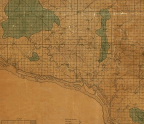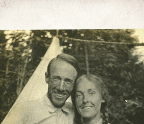“On, Wisconsin!”

On any given autumn Saturday, tens of thousands of men, women, and children pack the bleachers of Camp Randall Stadium to cheer on their favorite team, the Wisconsin Badgers. The massive bowl of concrete and steel, enclosed on the south by the stone walls of the Field House, has been home to the Badger football team for over one hundred years and has hosted a multitude of memorable events, athletic and otherwise. Camp Randall is a place where rivalries are renewed and traditions are sustained, a field rich with history that predates Badger athletics, and a setting made special by the fans and athletes, and the musicians and celebrities, who have entered its gates.
Camp Randall in the Civil War
In May 1861, Colonel S. Park Coon, newly commissioned to lead the Second Wisconsin Infantry, rode out a mile or so west of Madison to inspect some land where he might house and train his men. No one yet knew how many men would be sacrificed to suppress the rebellion of the Southern states, but Wisconsin governor Alexander Randall continued to accept recruits after the initial regiment for which his state was responsible had been raised. These men would need a place to learn how
You’re reading a preview, subscribe to read more.
Start your free 30 days





